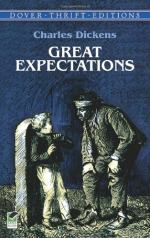“Take him past that window, and let me see him.”
The window indicated, was the office window. We all three went to it, behind the wire blind, and presently saw the client go by in an accidental manner, with a murderous-looking tall individual, in a short suit of white linen and a paper cap. This guileless confectioner was not by any means sober, and had a black eye in the green stage of recovery, which was painted over.
“Tell him to take his witness away directly,” said my guardian to the clerk, in extreme disgust, “and ask him what he means by bringing such a fellow as that.”
My guardian then took me into his own room, and while he lunched, standing, from a sandwich-box and a pocket flask of sherry (he seemed to bully his very sandwich as he ate it), informed me what arrangements he had made for me. I was to go to “Barnard’s Inn,” to young Mr. Pocket’s rooms, where a bed had been sent in for my accommodation; I was to remain with young Mr. Pocket until Monday; on Monday I was to go with him to his father’s house on a visit, that I might try how I liked it. Also, I was told what my allowance was to be — it was a very liberal one — and had handed to me from one of my guardian’s drawers, the cards of certain tradesmen with whom I was to deal for all kinds of clothes, and such other things as I could in reason want. “You will find your credit good, Mr. Pip,” said my guardian, whose flask of sherry smelt like a whole cask-full, as he hastily refreshed himself, “but I shall by this means be able to check your bills, and to pull you up if I find you outrunning the constable. Of course you’ll go wrong somehow, but that’s no fault of mine.”
After I had pondered a little over this encouraging sentiment, I asked Mr. Jaggers if I could send for a coach? He said it was not worth while, I was so near my destination; Wemmick should walk round with me, if I pleased.
I then found that Wemmick was the clerk in the next room. Another clerk was rung down from up-stairs to take his place while he was out, and I accompanied him into the street, after shaking hands with my guardian. We found a new set of people lingering outside, but Wemmick made a way among them by saying coolly yet decisively, “I tell you it’s no use; he won’t have a word to say to one of you;” and we soon got clear of them, and went on side by side.
Chapter 21
Casting my eyes on Mr. Wemmick as we went along, to see what he was like in the light of day, I found him to be a dry man, rather short in stature, with a square wooden face, whose expression seemed to have been imperfectly chipped out with a dull-edged chisel. There were some marks in it that might have been dimples, if the material had been softer and the instrument finer, but which, as it was, were only dints. The chisel had made three or four of these attempts at embellishment over his nose, but had given them




